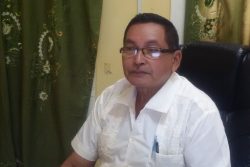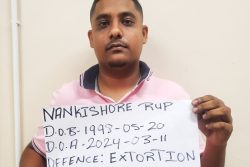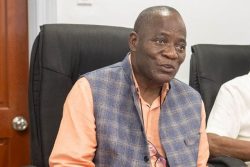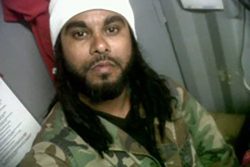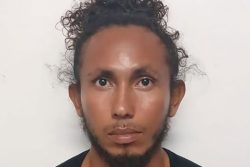By Ryan Benschop
Ryan Benschop is 17 years old, and is currently studying four subjects (Business, Economics, Law and Psychology) through the Cambridge International Advanced Level programme at Nations’ Sixth Form College. He previously attended Queen’s College, and graduated from fifth form last year. His main interest is entrepreneurship, particularly within the tech space, and he intends to pursue this field upon completing sixth form.
 This past week, I, along with eight other members of STEM Guyana’s robotics team, had the pleasure of participating in the FIRST Global Challenge 2017. FIRST (For Inspiration and Recognition of Science and Technology) was founded in the US in 1989 to inspire young people’s interest and participation in science and technology. FIRST Global is a new challenge designed to ignite a global passion for STEM, by having national teams design and build a robot from scratch given a kit of materials, and compete in person in a series of games, which are modeled after a pressing world problem.
This past week, I, along with eight other members of STEM Guyana’s robotics team, had the pleasure of participating in the FIRST Global Challenge 2017. FIRST (For Inspiration and Recognition of Science and Technology) was founded in the US in 1989 to inspire young people’s interest and participation in science and technology. FIRST Global is a new challenge designed to ignite a global passion for STEM, by having national teams design and build a robot from scratch given a kit of materials, and compete in person in a series of games, which are modeled after a pressing world problem.
The 2017 competition, “H2O FLOW” addressed water scarcity and contamination issues. The premise given was that two villages exist on either side of a contaminated river, and villagers compete to create and store purified water in their respective reserves (a local example of this would be the 1995 OMAI spill where cyanide and heavy metal laden water spilled into the Essequibo river affecting areas like Bartica). In a laboratory up stream of the contamination, however, the villagers unite to research the contaminants and ultimately create a purification system so contaminants are removed before they reach the villages, thus providing clean water for all. In the end, each village also prepares for the coming flood by searching for higher ground. The actual course upon which the robots compete is thus designed to award points based on the number of contaminants each robot gives to the laboratory and the amount of clean water stored in an elevated location more resilient to flooding. The contaminants and clean water were distinguished by the colour of the balls (orange vs blue respectively) during the competition and a ramp was used to indicate the higher-level reservoir.
Team Guyana comprised six students – Arrianna Mahase, Sahief Poese, both first year Computer Science students at the University of Guyana, Christopher Nelson, a student of electrical engineering at the Government Technical Institute, Vevekeanand Ramnarace, a science student of the Bishops’ High School, Anthony Frank, an expert self-taught programmer, and myself, Ryan Benschop, an A-Levels student at Nations’ Sixth Form College. There were three mentors – Farnaz Baksh, team manager, Horace Moseley, Public Relations specialist, and Ricky Chan, team coach. The team was supported by many additional members, who also played important roles in the overall preparation, and led and organized by Karen Abrams, co-founder of STEM Guyana. Each person added to the team in their unique and valuable way, and the resulting chemistry contributed significantly to our outstanding results.
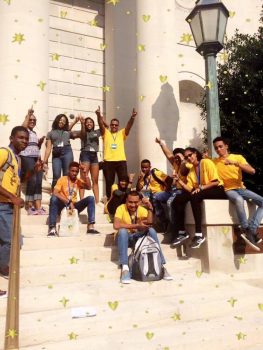
Preparation for such a global competition was no effortless task; the team had been working diligently since we received our robot kit early in April, a mere four months ago. The frequency of our meetings steadily increased from Saturdays only, to daily, as we became increasingly anxious and determined to perfect our creation. In trying to design a robot that completed every task of the game efficiently and effectively, we faced numerous issues, as the challenges of the game were not simple. One of the main reasons for our success at this competition was our ability to observe our immediate surroundings, and creatively implement existing local structures and mechanisms into our design.
Perhaps the most troubling task for every team was to create a system for the robot to pull itself off the ground using a climbing bar. The difficulty of this task was due to the weight of the robot – over 20 pounds, far too much for the small motors the robot used to lift. After spending weeks tinkering and reshaping, hoping that this and that design worked, we thought of a similar problem, which was already solved in our local environment. We looked to the koker, without which Guyana’s coastline would not exist. This intricate mechanism is what has enabled the effective drainage of our low-lying coast, six feet below sea level. It offered a potential answer to our problems. If such a mechanism can allow just one or two persons to lift a door weighing hundreds of pounds, would it be possible for us to create a similar mechanism to allow our robot’s tiny motors to easily lift over 20 pounds? On this thought, the team visited several kokers around the city, and studied the design and mechanics behind each one. Upon realizing that the very mechanisms and parts which allowed the koker to be lifted were in our own robot kit, we immediately began working on a similar system. This pull-up system worked perfectly, and never failed us during the competition. This, among many other difficulties, resulted in hundreds of hours and many all-nighters spent, as Team Guyana ensured their bot was a meritable force in this global competition. As the days of competition grew nearer and nearer, the team’s confidence rose, and the realization truly dawned that we had built a powerful and very capable machine, and were ready to dominate the competition.
Arriving in Washington D.C. and seeing the hundreds of students from around the world was a captivating experience. There were many exciting places to go and activities to take part in in this foreign country, but the team stayed focused and remembered the goal. This was especially important the night before the competition, as one of our robot’s main components became dislodged, and took several hours of recalibration to restore. Well primed on the day of the competition, the robot performed fantastically during the first match, and was among the first alliance to score over 100 points. During our second game, however, we were faced with a potentially devastating setback – during the first half of the match, our robot was unable to function, as it failed to connect to our controlling device. However, the problem was solved and Team Guyana’s robot joined mid-game scoring last-minute points which resulted in a victory that was all the sweeter given the challenges we had faced. After a third excellent performance, the final for the first day, Team Guyana was ranked #1 of 163 countries!
Each match consisted of two alliances of three countries each (which were random and different each match, to encourage cooperation among countries from all over), playing against each other. One of our most interesting alliances was that of the fifth match, where we were teamed with Ivory Coast. The challenge here was both to assist them in improving the functionality of their robot in a very limited time, and to communicate effectively, as most of their members only spoke French. However, after a few quick google translations, I managed to remember enough French to break this barrier between Guyana and Côte d’Ivoire. Another truly remarkable selection was that of the final match, where we were set to play against Germany. Though we were on opposing sides, Guyana and Germany communicated before the match, and devised a strategy aimed at earning the “coopertition bonus” – 15 points awarded to all teams in the match, if the river was cleared of all contaminant particles at the end. The team spirit and cooperation by these teams and many others were extremely admirable, and are what I believe was the heart of the FIRST Global Challenge.
Despite our setback, the circumstances during the first day appear very fortunate in comparison with the second and final day of the competition. Immediately prior to our fourth match, a teammate’s robot was damaged, and could hardly operate. Afterward, the team learnt about Ivory Coast’s robot, and some of its problematic components. Despite spending almost three hours intensively building and repairing their robot, they were sidelined during the fifth match, while Team Guyana’s second teammate for the same match could not join until the end, due to similar a connection problem we experienced in the second match. Though we played solo against three other robots in this game, and experienced even more connectivity issues in the last, Team Guyana fought valiantly until the end and never lost hope.
These challenges, and how they were faced and overcome, highlight one of the main lessons learnt from this competition – that determination and persistence are crucial for success. Our performance did not suffer because our main component failed the night before the competition; it did not suffer because we joined one of our games halfway through; it did not suffer because we played an entire match solo. Rather, our setbacks lit a fire inside us – a burning desire to persist and strive for victory. And, so we did, and at the end of this and despite all of these obstacles which we learned from in our determination to overcome them, we defended an enviable 10th position out of the many participating countries.
During the course of the competition, we have developed lifelong skills in many areas, such as teamwork (the heart of this competition), problem solving (especially under pressure), time and resource management, and, most importantly, the determination and attitude of never giving up that led to our success. We have formed valuable global relationships and connections, broken barriers such as language and culture, and have done very well to strengthen our confidence as a nation in an area where it is much needed.
Team Guyana’s performance and overall experience has proven that Guyana can be a formidable player in robotics, and tech as a whole, and this will inspire such an attitude in many Guyanese, and help to pave the way for much development and progress.
Next year’s challenge is already in the works. Even though the specifics, such as what kind of robot needs to be built, or what the game will be, have not yet been announced, the FIRST Global community (especially Guyana) is already excited to participate, and we are sure that we will carry forth the lessons learnt this year, and prove an even more incredible competitor, in the FGC 2018.




